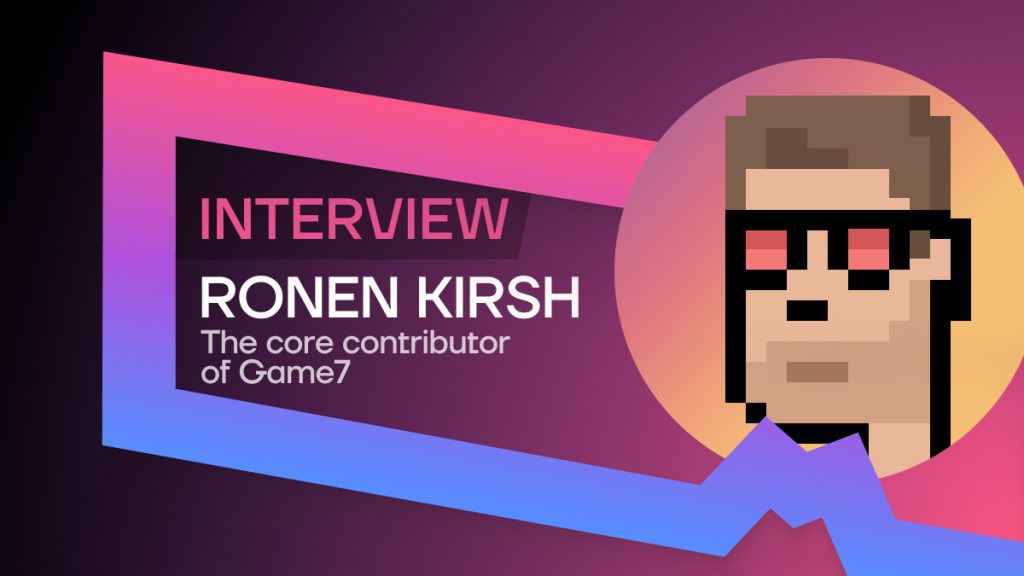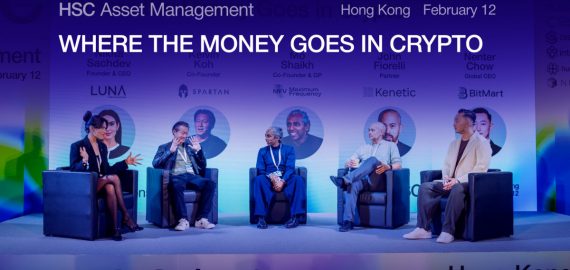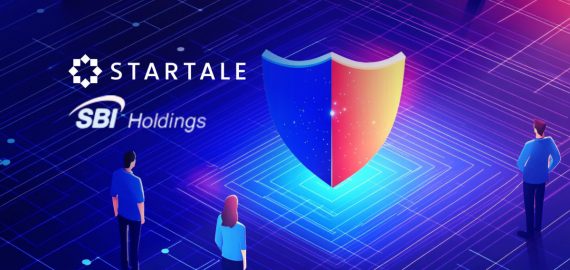Game7 Core Contributor Ronen Kirsh Says Web3 Games Will Serve as the ‘ChatGPT moment for AI’


Ronen Kirsh, the core contributor of web3 gaming DAO Game7, is a leader in the web3 gaming space. His journey in the web3 gaming industry began with the realization that there was a stark difference between how games and web3 products are built. Besides his role at Game7, he is also leading strategic partnerships at Forte, a blockchain tech platform for web3 games.
He saw a lack of collaboration and sharing of information among web3 game developers, which led him to form a community with like-minded individuals. This community eventually became Game7, which is working towards building a better gaming industry. With his team at Game, he is working toward a future where the interests of players and developers are aligned and communities are the foundation of gaming products.
Listening to game developers and players, Ronen and his team realized that almost everyone was unhappy with the current state of the gaming industry. The rise of free-to-play games had made gaming more accessible, but it also created a design problem that limited the industry’s potential. To solve this problem, Ronen recruited other believers and started building bottom-up products with communities as first principles.
Kirsh’s vision for the future of web3 gaming is now coming to fruition with Game7, which launched a $100 million grant in November to accelerate web3 game development. Game7 also launched a gamified community management platform Summons, at ETHDenver.
We speak to Kirsh about how Game7 is making an impact on the web3 gaming industry and where he sees the future of web3 games going.
What piqued your interest in the web3 gaming space, and where did you first hear about it?
My interest in web3 gaming was piqued when I heard about the Diablo Auction House. You know, an in-game marketplace where players could buy and sell virtual items for real-world currency. It was a big flop! The system’s security was weak, and hackers could easily duplicate items leading to inflation and the destruction of the economy. In fact, it was so bad that the players lost trust in it, and it was shut down.
Then, I stumbled upon Bitcoin and realized it could solve most of Diablo’s issues. It could provide a secure and transparent system for asset ownership and trading, preventing players from duplicating items and protecting the economy from inflation or destruction. And with transparency and authenticity to virtual item trading, it could create a more trustworthy and secure virtual marketplace for players.
Game7 previously launched NFT Inventory and now Summon. What inspired the creation of these two products?
- NFT Inventory: While speaking to game developers for our Game Developer Report, we found that existing smart contracts and NFT standards are not optimized for game development.
To solve this challenge, we partnered with the team at Moonstream.to, who are just as passionate as we are about web3 gaming. Together, we launched NFT Inventory, a standard that operates as an on-chain tracking system capable of handling traditional gaming use cases as yet unresolved by web3.
Game developers no longer have to run complex smart contract upgrades, implement error-prone DNA systems, and drastically change their game servers to expand their games.
The process is also easier for web2 game developers, who are provided with the tools they need to move their in-game assets on-chain. This means that inventory systems, hit points, experience points, and more can be taken from an off-chain environment to an on-chain one in a seamless process.
- Summon: Humanity has always dreamed of creating a more fair society, one that is collaborative and merit-based.
Game7’s commitment to decentralizing its governance resulted in significant research into existing open-source solutions that could give us what we needed to deliver on our original promise. We realized that there were many great disconnected solutions, but no all-in-one solution catered toward our original progressive decentralization plans. As a result, we’ve decided to incubate a product that will meet our precise challenges, with the intention of providing it to the larger web3 community so that they may benefit as well.
How do you see NFT Inventory impacting the overall web3 gaming ecosystem, and what potential do you see for its adoption in the industry?
Currently, every game has its own inventory system, which is off-chain. To create real value economies in games, a strong security system is required. In the past, the Diablo Auction House failed because of weak security. By putting game assets on-chain, game developers can inherit the security of the public chains, protecting the economy from player “dupping,” leading to inflation and the destruction of the economy.
Furthermore, there will be many solutions available in the market, and open-source standards may lead the industry towards more on-chain and transparent inventory systems for game economies. By utilizing NFT inventory, the web3 gaming ecosystem can potentially see increased security, value, and transparency.
NFT Inventory enables game designers to define in-game assets that are owned by the player’s NFT character, not by the player’s wallet. Why is that important?
First, the web3 industry is moving towards representing personal identities as wallets, so it makes sense for game assets to be tied to the NFT character, given that players can use the same wallet across multiple games with different characters.
Additionally, in web2 games, players create accounts specifically to sell to other players after gaining significant benefits, items, and status, resulting in gray market activity that’s popular in almost every successful game. However, with crypto, you can’t sell your private key to your account.
This solution will open up the opportunity for players to spend time and effort in the game and reap the benefits from their time spent. By attaching reputation, assets, and more to the NFT character, game designers can create game and economic designs that are not achievable otherwise.
What plans does Game7 have for the future of NFT Inventory and Summon, and how do you see them evolving to meet the changing needs of the web3 gaming industry?
Our motto is to listen, then act. We don’t claim to have all the answers but are committed to finding them together. That means we resist assumptions and rely on research to inform our projects.
Now that the products are announced, we will proceed with community feedback that will inform where we should be taking things next and build with a community-first approach to ensure we’re building products people want to use. We listen, then build products that are designed with the community’s needs in mind, rather than building something hoping “they will come.”
What do you think about the current state of the web3 gaming space? What kind of role does Game7 play in it?
With billions of gamers around the world, we are a nation of our own. We believe that together we have the power to do better than the current status quo.
When we went out and spoke to game developers (Game Developer Report), it was evident that almost everyone was unhappy. On the one hand, developers can no longer be creative and build meaningful worlds due to unsustainable business models. On the other hand, players have become frustrated with pay-to-win models that are extractive in nature.
We’re living through one of the most significant creative and economic opportunities in history. With the convergence of blockchain technology and games, what we do has the potential to impact billions. What comes next will change everything. Game7 will be successful when digital and game economies are more aligned. By then, we will have forever changed the conversation about what it means to build sustainable games and digital economies.
Where do you think we could see web3 gaming in the near future?
First, it’s important to note that some of the greatest products in history were built during bear markets. I believe this applies to web3 gaming too. In the coming years, we’ll see the first handful of games that inherit the benefits of blockchain technology for real value economies.
These games will serve as the ‘ChatGPT moment for AI’ and inspire other game developers to jump in with more capital, resources, and creative designs.
It’s an exciting time to be in web3 gaming, with the infrastructure almost ready to scale and UX significantly improved over the past three years. There are now many off-the-shelf solutions available to experiment with, allowing game developers to go to market quickly, which expedites time to market and experimentation. With all these advances, the possibilities are endless, and I can’t wait to see where web3 gaming takes us in the near future!
Read more:
Disclaimer
In line with the Trust Project guidelines, please note that the information provided on this page is not intended to be and should not be interpreted as legal, tax, investment, financial, or any other form of advice. It is important to only invest what you can afford to lose and to seek independent financial advice if you have any doubts. For further information, we suggest referring to the terms and conditions as well as the help and support pages provided by the issuer or advertiser. MetaversePost is committed to accurate, unbiased reporting, but market conditions are subject to change without notice.
About The Author
Cindy is a journalist at Metaverse Post, covering topics related to web3, NFT, metaverse and AI, with a focus on interviews with Web3 industry players. She has spoken to over 30 C-level execs and counting, bringing their valuable insights to readers. Originally from Singapore, Cindy is now based in Tbilisi, Georgia. She holds a Bachelor's degree in Communications & Media Studies from the University of South Australia and has a decade of experience in journalism and writing. Get in touch with her via [email protected] with press pitches, announcements and interview opportunities.
More articles

Cindy is a journalist at Metaverse Post, covering topics related to web3, NFT, metaverse and AI, with a focus on interviews with Web3 industry players. She has spoken to over 30 C-level execs and counting, bringing their valuable insights to readers. Originally from Singapore, Cindy is now based in Tbilisi, Georgia. She holds a Bachelor's degree in Communications & Media Studies from the University of South Australia and has a decade of experience in journalism and writing. Get in touch with her via [email protected] with press pitches, announcements and interview opportunities.


















































